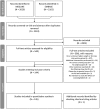Maternal obesity in pregnancy impacts offspring cardiometabolic health: Systematic review and meta-analysis of animal studies
- PMID: 30633422
- PMCID: PMC6849816
- DOI: 10.1111/obr.12817
Maternal obesity in pregnancy impacts offspring cardiometabolic health: Systematic review and meta-analysis of animal studies
Abstract
Obesity before and during pregnancy leads to reduced offspring cardiometabolic health. Here, we systematically reviewed animal experimental evidence of maternal obesity before and during pregnancy and offspring anthropometry and cardiometabolic health. We systematically searched Embase and Medline from inception until January 2018. Eligible publications compared offspring of mothers with obesity to mothers with a normal weight. We performed meta-analyses and subgroup analyses. We also examined methodological quality and publication bias. We screened 2543 publications and included 145 publications (N = 21 048 animals, five species). Essential methodological details were not reported in the majority of studies. We found evidence of publication bias for birth weight. Offspring of mothers with obesity had higher body weight (standardized mean difference (SMD) 0.76 [95% CI 0.60;0.93]), fat percentage (0.99 [0.64;1.35]), systolic blood pressure (1.33 [0.75;1.91]), triglycerides (0.64 [0.42;0.86], total cholesterol (0.46 [0.18;0.73]), glucose level (0.43 [0.24;0.63]), and insulin level (0.81 [0.61;1.02]) than offspring of control mothers, but similar birth weight. Sex, age, or species did not influence the effect of maternal obesity on offspring's cardiometabolic health. Obesity before and during pregnancy reduces offspring cardiometabolic health in animals. Future intervention studies should investigate whether reducing obesity prior to conception could prevent these detrimental programming effects and improve cardiometabolic health of future generations.
Keywords: Cardiometabolic health; obesity; pregnancy; systematic review.
© 2019 The Authors. Obesity Reviews published by John Wiley & Sons Ltd on behalf of World Obesity Federation.
Conflict of interest statement
The authors declare no conflict of interest.
Figures



References
-
- WHO . Obesity and Overweight Fact Sheet. World Health Organisation; 2017.
-
- Heslehurst N, Rankin J, Wilkinson JR, Summerbell CD. A nationally representative study of maternal obesity in England, UK: trends in incidence and demographic inequalities in 619 323 births, 1989‐2007. Int J Obes (Lond). 2010;34(3):420‐428. - PubMed
-
- Aune D, Saugstad OD, Henriksen T, Tonstad S. Maternal body mass index and the risk of fetal death, stillbirth, and infant death: a systematic review and meta‐analysis. JAMA. 2014;311(15):1536‐1546. - PubMed
Publication types
MeSH terms
Grants and funding
LinkOut - more resources
Full Text Sources
Medical

